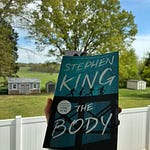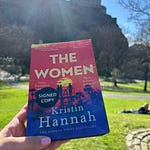Genre: Nonfiction
My Rating: 7/10
Goodreads Rating: 3.74/5 on Goodreads
"As women... we were supposed to concern ourselves with whether or not everyone else felt at ease."
Honestly, I don’t usually gravitate toward nonfiction. By the time I get home and settle in with a book, I just want to escape reality. Still, I set a goal for myself to read one nonfiction title a month because I like to have a little balance in my life.
I picked this one up at a small, female-owned bookstore in Woodstock, NY last summer while visiting with my mom. The cover art and concept pulled me in instantly. And yet... it sat on my shelf for almost a year.
Lately, though, life has been heavy. There’s so much hate, uncertainty, arguing, and conflict going on in the world right now, and if I’m being candid, I’ve had a really hard time feeling “happy.” So I decided it was finally time to dive in and see if this book could offer me any insight or advice that would help pull me up out of this slump.
Initially, I was hooked by the introduction. Ariel Gore points out that, just like other areas of physical and mental health research, women are often left out of the research. In fact, most of what we know (or think we know) about happiness comes from men – male researchers, male authors, male perspectives. So what does happiness actually look like for women?
What the Book Explores
Ariel covers so many things that I think I knew, but hadn’t really spent time sitting with:
Women are constantly told to smile. It’s as if our happiness is for the benefit of others, and that somehow, smiling will make us feel better. (Spoiler: it doesn’t always.)
In society, women are discouraged from being selfish, yet self-sacrifice is rarely the path to lasting happiness.
America likes to brand itself as a happy culture, but much of that is toxic positivity in disguise: pressure to perform joy rather than genuinely feel it.
Some researchers believe happiness has a “set point” similar to body weight. While genetics may influence that baseline, major life events such as divorce, job loss, and health issues can shift it permanently.
The opposite of joy isn’t necessarily depression. For many, especially women, it’s anxiety.
The book also touches on the complex relationship between women, money, and happiness. There's a chapter on motherhood that really stood out. Ariel makes space for the idea that you can love your children more than anything, yet still feel deep unhappiness because of motherhood’s demands. She briefly addresses the joy of being childfree (and the judgment that often follows women who make that choice). Of course, that part felt especially personal to me.
What I Took Away
While I enjoyed reading this and felt it affirmed a lot of what I’ve already believed or observed, I didn't find it particularly groundbreaking. I also wish it had included more actionable steps or tools to apply in everyday life. Still, these were my key takeaways that I want to remember the next time I guilt myself for feeling sad:
Society’s expectations set women up to fail in the happiness department. We’re not allowed to be selfish or put ourselves first and that’s a problem.
For women, happiness often coexists with sadness. It’s a grey area, not a binary.
The happiest women tend to have strong personal boundaries, freedom of choice, and a sense of agency over their lives.
Self-reliance and practicing gratitude can both help sustain happiness, but they’re not magic fixes.
And most importantly: happiness is hard work. It doesn’t just happen to you. You have to put in effort, be intentional, and make space for it.
If you liked this book, you might also like tiny beautiful things by Cheryl Strayed.











Share this post